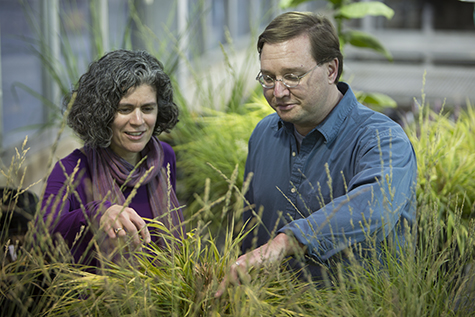
Washington University in St. Louis Chancellor Mark S. Wrighton has announced the creation of new four-year Danforth Fellowships for students in any PhD program with an interest in plant sciences. The new fellowships will enhance the St. Louis regional effort in plant sciences and will contribute to building the collaboration between Washington University and the Donald Danforth Plant Science Center.
The goal is to attract bright students highly motivated to use science to improve the world and the human condition, and to foster a culture of intellectual entrepreneurship focused on research and innovation in plant sciences. Danforth Fellows will be supervised by Washington University faculty or by Danforth Plant Science Center scientists who are a part of the Division of Biology and Biomedical Sciences (DBBS).The fellowships are made possible by a generous gift from William H. Danforth, who served as Washington University’s chancellor for 24 years and later chaired the Board of Trustees. The gift is the largest for graduate education in the university’s current capital campaign.“These fellowships are intended to enhance and expand our Plant and Microbial Biosciences graduate program and to do so in collaboration with the Danforth Plant Science Center,” Wrighton said. “Washington University is deeply grateful to Bill Danforth for both his generosity and his wisdom in making these important fellowships possible. “Bill understands the importance of plant science to the world, and we are fortunate in having his leadership to make the St. Louis region the leading center for plant science education and research,” Wrighton said.“Support for PhD students is one of the most important resources needed for both education and research in the plant sciences,” said James C. Carrington, PhD, president of the Donald Danforth Plant Science Center. “Our scientists are thrilled to work with talented doctoral students and with Washington University to develop our region as a premier place to train the next generation of plant scientists.”While Danforth initially trained as a physician and biochemist, he has maintained a lifelong interest in agriculture, sustainability and feeding the hungry. As chancellor, he urged the establishment of a strong plant biology program in the Department of Biology in Arts & Sciences that raised the university’s national prominence in the field. Improving human nutrition
Following his retirement as chancellor in 1995, Danforth became the driving force behind the establishment of the Donald Danforth Plant Science Center, whose mission is to improve the human condition through plant science. In 2003, he chaired the task force that established the National Institute of Food and Agriculture within the U.S. Department of Agriculture. “For every $1 tagged for research in plant science,” Danforth said, “$14 are dedicated to biomedical science. But for the world as a whole, adequate nutrition is as fundamental as good medical care to human health. Applying modern biologic research to plants offers opportunities to enhance their nutritional content, increase agricultural production in sustainable ways, replace fossil fuels with biofuels, and spin off technologies that will power economic growth.”“The addition of these fellowships significantly strengthens our doctoral program,” said Barbara A. Schaal, PhD, the Mary-Dell Chilton Distinguished Professor of Biology and dean of the Faculty of Arts & Sciences. “Plant science forms the basis for all of agriculture, and agriculture faces increasing challenges in the future. Only by attracting the best and brightest students will the nation be able to meet these challenges.”DBBS spans both the university’s Danforth and Medical campuses, includes adjunct faculty from the Danforth Plant Science Center and provides doctoral programs in biology and the biomedical sciences. Established in 1973, the division has become a national model for graduate education in biology and biomedical sciences because of its collaborative, interdivisional approach.Prepared for life after graduation
Unlike traditional doctoral training programs, which are organized along departmental lines, the division trains students in programs organized around 12 scientific interests. There are currently 559 students in the division, including 21 in the Plant and Microbial Biosciences (PMB) graduate program, which is co-directed by Joseph Jez, PhD, and Petra Levin, PhD, associate professors in the Department of Biology in Arts & Sciences. John Russell, PhD, professor of developmental biology and associate dean of graduate education in DBBS, welcomed the expansion of opportunities for graduate students and said he is particularly pleased that the fellowships will continue the division’s efforts to better prepare students for life after graduation. Almost a third of doctoral graduates in the sciences end up in nonacademic fields such as biotechnology, business or law, where they use their technical and critical-thinking skills in not only research, but also commercialization or intellectual property,” Russell said.“In the past, graduates largely stumbled into these areas,” Russell said. The new fellowships recognize the importance of the nonacademic components of a successful career and provide training that allows students to develop the skills needed to succeed in these areas at an earlier stage of their careers. The first Danforth Fellows will be named this fall. Jez and Levin emphasize that the program is interested in recruiting students from a wide variety of backgrounds, provided their research is focused on problems in plant science and they are affiliated with a DBBS lab. Students with backgrounds in genomics, biochemistry, biophysics, chemistry, engineering, and earth and planetary sciences are encouraged to apply. Interested students should email Joseph Jez or Andrea Krussel, PMB program coordinator.